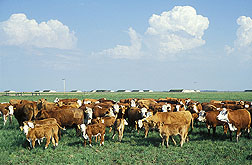Tackling Cattle Fever Ticks with Vaccines
By Sandra Avant
January 12, 2016
Despite a successful program to eliminate cattle fever ticks during the first half of the 20th century, these ticks still manage to cross the Mexican border into Texas. A new vaccine developed by Agricultural Research Service (ARS) scientists with the U.S. Department of Agriculture (USDA) could control these pests and help prevent a reinfestation of cattle fever ticks in the United States. These ticks can transmit pathogens that cause bovine babesiosis and anaplasmosis—diseases that can kill cattle.
While sequencing the cattle tick's genome, insect physiologist Felix D. Guerrero and his colleagues at the ARS Tick and Biting Fly Research Unit in Kerrville, Texas, identified several proteins that, when formulated as a cattle vaccine, could potentially kill cattle ticks. One of the proteins, aquaporin, was developed into a recombinant tick aquaporin protein vaccine.
ARS researchers collaborated with their partners at the Brazilian Agricultural Research Corporation (Embrapa) to test the vaccine's ability to protect cattle against infestation. In two trials, animals infested with a known amount of cattle tick larvae were divided into two pens in Brazil. In each trial, one group was vaccinated with the aquaporin vaccine, and the other group was not. When scientists compared the groups, they found that vaccinated cows had 75 percent and 68 percent fewer ticks than unvaccinated cows. Results indicated that the aquaporin protein was effective as an antigen in cattle vaccines to help prevent cattle fever tick infestations.
Although a few chemicals are available to treat cattle, ticks have developed resistance to most of them, according to Guerrero. The ARS-patented aquaporin protein vaccine provides an alternative to chemicals to reduce the risk of tick infestation. ARS is exploring the possibility of producing a commercial aquaporin vaccine with a private company.
ARS is USDA's principal intramural scientific research agency, and this research supports the USDA priority of promoting international food security.
Read more about this research in the January issue of AgResearch magazine.

